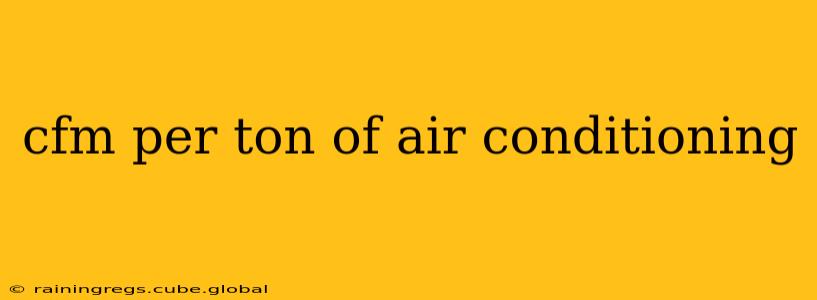CFM per Ton of Air Conditioning: A Comprehensive Guide
Choosing the right air conditioning system involves understanding several key factors, and one of the most crucial is the relationship between cubic feet per minute (CFM) and tons of cooling capacity. This guide will delve into the intricacies of CFM per ton of air conditioning, helping you make informed decisions about your cooling needs.
What is a "Ton" of Air Conditioning?
Before we dive into CFM, let's clarify what a "ton" represents in the context of air conditioning. One ton of air conditioning refers to the cooling capacity needed to freeze one ton (2,000 pounds) of water in 24 hours. This translates to approximately 12,000 BTUs (British Thermal Units) per hour. A higher tonnage means a more powerful cooling system.
The Relationship Between CFM and Tons
CFM, or cubic feet per minute, measures the volume of air moved by the air conditioner's blower. It's a critical factor in determining how effectively the system can cool a space. The ideal CFM per ton isn't a fixed number; it depends on several variables, including:
- Room size and layout: Larger rooms require higher CFM to circulate cooled air effectively. A complex layout with many obstacles can also impact air circulation.
- Ceiling height: Higher ceilings require a greater CFM to adequately cool the entire space.
- Insulation and window efficiency: Well-insulated spaces with energy-efficient windows require less CFM as heat gain is minimized.
- Number of occupants and heat-generating appliances: More occupants and appliances generate more heat, necessitating higher CFM for adequate cooling.
How Many CFM per Ton Do I Need?
There's no one-size-fits-all answer to this question. A rough estimate is often cited as 400 CFM per ton, but this is just a starting point. A professional HVAC technician will conduct a load calculation to determine the precise cooling needs of your space, considering all the factors mentioned above. This calculation will provide the correct tonnage and the corresponding CFM required for optimal performance.
Why is the Right CFM Crucial?
Insufficient CFM leads to several problems:
- Uneven cooling: Some areas will remain too hot, while others may be excessively cold.
- Increased energy consumption: The system will struggle to cool the space, leading to longer run times and higher energy bills.
- System damage: Overworking the system can lead to premature wear and tear, shortening its lifespan.
- Poor indoor air quality: Inadequate airflow can lead to stagnant air and a build-up of pollutants.
What Happens if I Have Too Much CFM?
While insufficient CFM is a more common problem, excessive CFM can also create issues. It can lead to:
- Short cycling: The system turns on and off too frequently, reducing efficiency and potentially increasing wear and tear.
- Excessive drafts: Too much airflow can cause uncomfortable drafts.
- Increased noise: Higher CFM often translates to a louder system.
How Do I Determine the Correct CFM for My System?
The best way to determine the correct CFM for your air conditioning system is to consult a qualified HVAC technician. They will perform a thorough assessment of your space, considering all relevant factors, and provide a tailored recommendation for your cooling needs. This ensures optimal comfort, energy efficiency, and longevity of your system. Relying on general estimates can lead to suboptimal performance and potential problems down the line.
Can I Calculate CFM Myself?
While you can find online calculators, these are often simplified and may not account for all the variables that a professional would consider. While a basic calculation might give a rough idea, it's highly recommended to consult a professional for accurate results.
In conclusion, understanding the relationship between CFM and tons of air conditioning is essential for effective cooling. While general guidelines exist, a professional assessment is crucial to ensure your system operates efficiently and provides optimal comfort for your specific needs. Don't hesitate to reach out to a qualified HVAC technician for a thorough evaluation.
